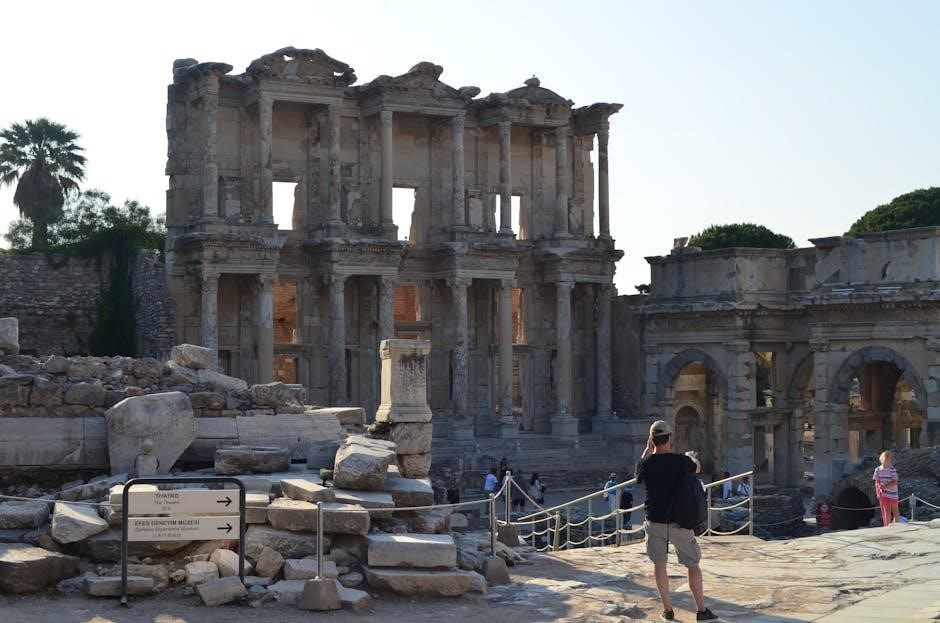Umrah is a minor pilgrimage, a recommended Sunnah performed any time except during Hajj, seeking Allah’s mercy and reflecting deep devotion and commitment.
Definition and Significance of Umrah
Umrah, often referred to as the minor pilgrimage, is a sacred Islamic ritual that embodies deep spiritual devotion. It is a voluntary act of worship, distinct from Hajj, and can be performed at any time of the year, except during the five days of Hajj. Umrah serves as an expiation for sins, fostering a sense of renewal and closeness to Allah. The pilgrimage includes key rituals such as Ihram, Tawaf around the Kaaba, Sai between Safa and Marwah, and trimming or shaving hair. Its significance lies in its ability to purify the soul and strengthen one’s faith, making it a cherished Sunnah for Muslims worldwide.
Overview of the Umrah Guide PDF
The Umrah Guide PDF is a comprehensive resource detailing the rituals, preparations, and essential supplications for a successful pilgrimage. It covers step-by-step processes, from entering Ihram to completing the rituals of Tawaf and Sai. The guide includes Arabic duas with English transliterations, practical tips, and visa requirements. Designed for both first-time and experienced pilgrims, it ensures a smooth and spiritually enriching experience. The PDF also highlights recommended prayers, etiquette, and common mistakes to avoid, making it an indispensable tool for those seeking to perform Umrah with devotion and correctness.

Preparation for Umrah
Preparation for Umrah involves spiritual readiness, physical health, and gathering essential items like Ihram clothing, toiletries, and prayer mats to ensure a smooth pilgrimage experience.
Spiritual and Physical Readiness
Spiritual and Physical Readiness
Spiritual readiness involves making a sincere intention, seeking forgiveness, and reciting supplications like Talbiyah. Physically, pilgrims must ensure good health, remove unwanted hair, trim nails, and perform Ghusl and Wudhu before donning Ihram. Men should wear two unstitched white garments, while women wear modest attire. It’s crucial to avoid prohibited acts during Ihram, such as covering the face or head for men. Pilgrims should also mentally prepare for the rituals ahead, focusing on devotion and humility. Proper physical and spiritual preparation ensures a pure and accepted Umrah experience, aligning with Islamic teachings and the guidance of the Prophet (peace be upon him).
Essential Items to Carry
Essential Items to Carry
Pilgrims should carry a small Quran, a dua book, and a lightweight prayer mat for convenience. Essentials like tissues, a water bottle, and comfortable shoes are vital for the journey. Men must bring Ihram garments (two unstitched white cloths), while women should pack modest, comfortable clothing. Toiletries, including unscented soap and a shaving kit, are necessary. Don’t forget identification, travel documents, and emergency contact information. Carry some local currency for incidental expenses and pack a small backpack for daily needs. Ensure all items comply with airline and Saudi regulations for a smooth and stress-free Umrah experience.

Umrah Rituals
Umrah rituals include entering Ihram, performing Tawaf around the Kaaba, completing Sai between Safa and Marwah, and shaving or cutting hair, fulfilling the sacred acts with devotion.
Entering the State of Ihram
Entering Ihram is the first ritual of Umrah, performed at designated Meeqat points. Pilgrims must prepare by removing unwanted hair, trimming nails, and performing Ghusl or Wudu. Men don two unstitched white garments, while women wear modest attire. The face and head should remain uncovered for men, while women may cover their hair but not their face. The intention (Niyyah) for Umrah is made, followed by reciting the Talbiyah prayer, which men recite aloud and women softly. This sacred state symbolizes purity and readiness to fulfill the divine call, marking the official start of the Umrah journey.
Performing Tawaf and Sai
Performing Tawaf involves circumambulating the Kaaba seven times counterclockwise, starting and ending at the Black Stone. Pilgrims must maintain purity, face the Kaaba, and recite supplications. After Tawaf, two rakats of prayer are performed behind Maqam Ibrahim. Sai follows, where pilgrims run or walk between Safa and Marwa seven times, emulating Hagar’s search for water. Each lap begins and ends at specific markers, with men often jogging part of the distance. These rituals symbolize devotion, spiritual cleansing, and remembrance of Prophet Ibrahim and his family, fulfilling a cornerstone of Umrah with sincerity and reflection.
Shaving or Cutting Hair
After completing Tawaf and Sai, pilgrims must shave or cut their hair to mark the end of Ihram. Men are required to shave their heads completely, while women cut a small portion. This act symbolizes humility and equality before Allah. It is a Sunnah to follow the Prophet’s example, ensuring the haircut is done with intention and gratitude. The ritual signifies the completion of Umrah and the lifting of Ihram restrictions. Pilgrims should recite supplications, thanking Allah for the opportunity. This step is essential for fulfilling the Umrah rites and preparing to return to normal life, with a renewed spiritual state.

Important Duas and Supplications
Key supplications include the Talbiyah during Ihram, prayers after Tawaf, and specific duas at Safa and Marwah. Arabic text with English transliteration is provided for ease of recitation, ensuring pilgrims can fulfill their spiritual obligations effectively.
Arabic Text with English Transliteration
The guide provides essential prayers and supplications in Arabic, accompanied by English transliteration, ensuring ease of recitation for pilgrims. Key duas include the Talbiyah, recited during Ihram, and prayers performed after Tawaf and Sai. These supplications, such as the Istikharah and Dua for forgiveness, are presented with clear pronunciation guides. The transliteration helps non-Arabic speakers perform the rituals with accuracy and devotion. This feature enhances the spiritual experience, allowing pilgrims to focus on the meanings and connect deeply with their faith during Umrah.
Recommended Prayers and Invocations
Key prayers and invocations are highlighted to enrich the Umrah experience. The Talbiyah, recited during Ihram, expresses devotion to Allah. After completing Tawaf, pilgrims are encouraged to pray for forgiveness and guidance. The Dua of Istikharah is recommended for seeking divine guidance. Additional invocations include prayers for health, wealth, and spiritual growth. These supplications, rooted in Islamic tradition, are provided with English translations and contexts, ensuring pilgrims can recite them with understanding and sincerity. They are designed to deepen the spiritual connection and maximize the blessings of the pilgrimage.

Visa and Travel Requirements
Obtaining an Umrah visa involves submitting required documents and following Saudi regulations. Travelers must book flights and accommodations in advance, ensuring compliance with entry requirements and health guidelines.
Step-by-Step Guide to Obtaining an Umrah Visa
Obtaining an Umrah visa requires careful preparation. First, gather necessary documents: a valid passport, completed visa application form, and recent passport-sized photos. Next, submit your application through an authorized travel agency or Saudi embassy, ensuring all details are accurate. Pay the visa fee and await processing, which typically takes a few weeks. Once approved, ensure your passport includes the visa stamp. Additionally, check health requirements, such as vaccinations, and book flights and accommodations in accordance with Saudi regulations. Proper planning ensures a smooth and hassle-free process for your pilgrimage.
Booking Travel and Accommodation
Booking travel and accommodation for Umrah requires careful planning to ensure a smooth pilgrimage. Start by researching reputable travel agencies or online platforms authorized by the Saudi government. Compare packages to find the best options for your budget, ensuring they include flights, hotel stays, and transportation. Opt for accommodations near the Haram in Mecca or Masjid Al-Nabawi in Medina for convenience. Verify the credibility of the agency and read reviews from previous pilgrims. Make sure to book well in advance, especially during peak seasons, to secure availability. Always check the terms and conditions, including flexibility for changes or cancellations.

Mistakes to Avoid During Umrah
Common errors include ignoring Ihram rules, incorrect Tawaf direction, missing Sai between Safa and Marwa, improper shaving/cutting of hair, and skipping essential supplications;
Common Errors and How to Prevent Them
Common mistakes during Umrah include improper Ihram procedures, incorrectly performing Tawaf, or failing to complete Sai between Safa and Marwa. Many pilgrims also make errors in hair shaving or cutting, such as shaving before completing all rituals. Additionally, some neglect essential supplications or perform Tawaf in the wrong direction. To avoid these errors, seek guidance from trusted resources or experienced pilgrims. Ensuring proper knowledge of rituals and staying vigilant during performances is crucial. Preparation and awareness are key to avoiding mistakes and ensuring a spiritually fulfilling Umrah experience.

Recommended Reading and Resources
Download the Umrah Guide PDF for step-by-step instructions, Arabic supplications, and travel tips. Explore books like “Sifatul-Hajj wal-Umrah” by Shaykh Uthaymeen and apps like Muslim Pro for guidance.
Books and Apps for a Successful Umrah
Enhance your Umrah experience with essential resources. ‘Sifatul-Hajj wal-Umrah’ by Shaykh Uthaymeen and ‘At-Tahqeeq wal-Eedhah’ by Shaykh Baz provide deep insights. Download the Umrah Guide PDF for step-by-step rituals and duas. Apps like Muslim Pro and Umrah Guide offer Arabic supplications, prayer timings, and Qibla directions. These tools ensure you stay guided throughout your journey, helping you fulfill rituals with precision and sincerity. They are indispensable companions for a spiritually enriching and well-prepared pilgrimage.
